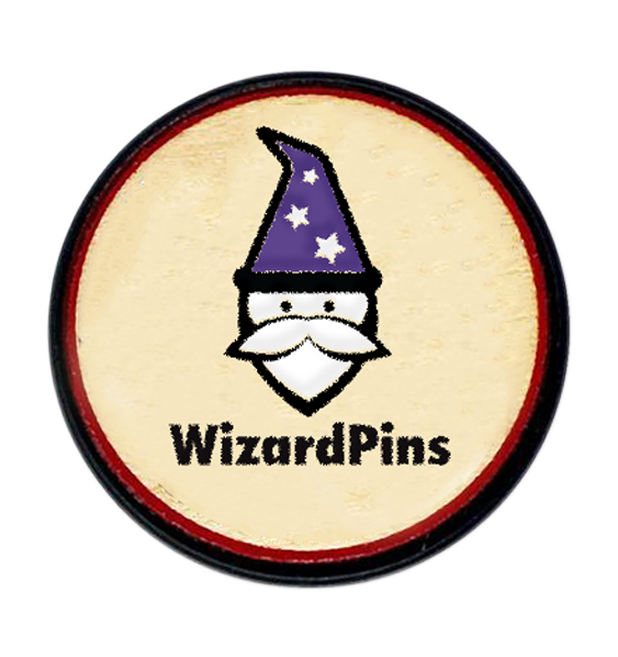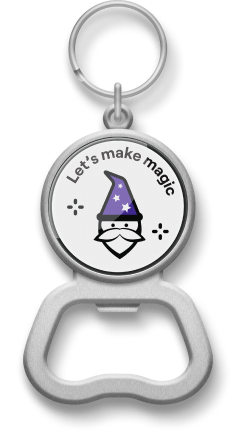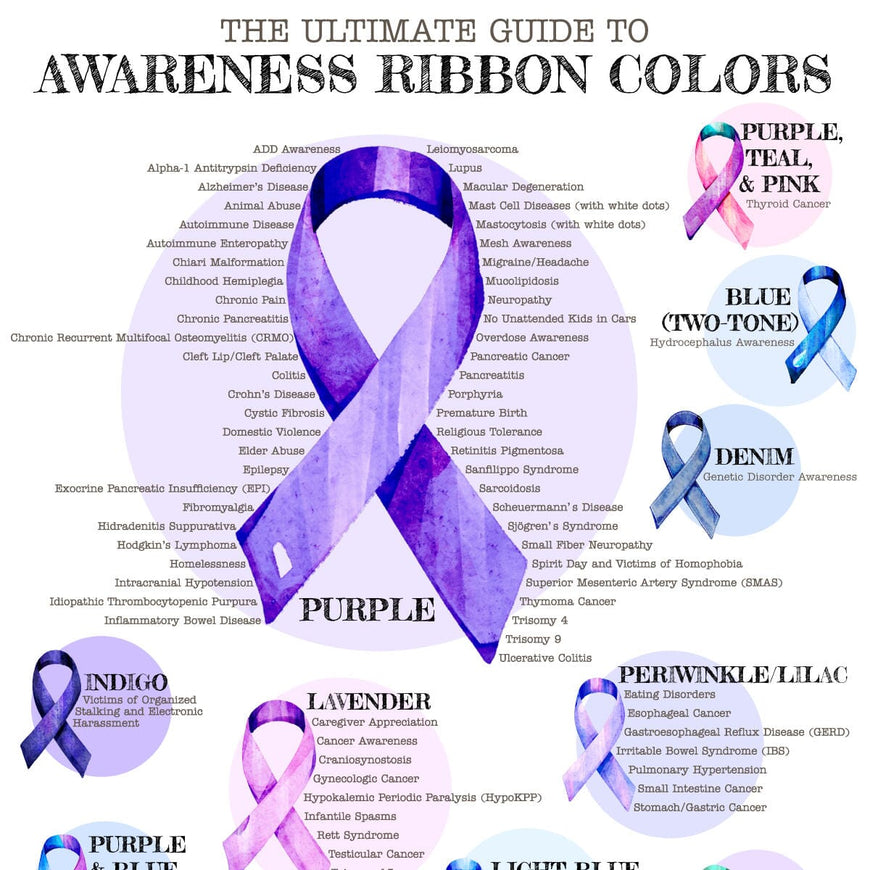This is the ultimate guide to awareness ribbons and their meanings. If you want to show your support for a cause, consider wearing an awareness ribbon. For an extended look at the different varieties, please consult the awareness ribbons chart by Wizard Pins below.

Pink Ribbon Meaning
One of the most famous awareness ribbons is the pink ribbon, commonly used as the breast cancer awareness ribbon. You may see more breast cancer awareness ribbons during Breast Cancer Awareness Month in October.
Purple Ribbon Meaning
Purple ribbons, aside from being a short-lived side-project by Outkast’s Big Boi, can represent a lot of different causes. Our research uncovered more than 50 meanings behind a purple ribbon, but perhaps the most prevalent is that someone will wear a purple ribbon when they want to take a stance against domestic violence. You may see more purple ribbons during the month of October as that is Domestic Violence Awareness Month. Other reasons someone might wear a purple ribbon is to create awareness for pancreatic cancer, epilepsy or Alzheimer’s Disease.
Purple awareness ribbons by month:
- February – Macular Degeneration
- April – Animal Abuse
- May – Cystic Fibrosis
- June – Migraines & Headaches
- August – Overdose Awareness
- September – ADD Awareness
- October – Domestic Violence
- November – Alzheimer’s Disease, Epilepsy & Pancreatic Cancer
Blue Ribbon Meaning
Blue ribbons have more than 40 different meanings, though the most well-known is child abuse prevention. You may see more blue ribbons during National Child Abuse Prevention Month in April. Navy blue ribbons aim to spread awareness for Erb’s Palsy and Rectal Cancer among other causes while light blue ribbons are most commonly associated with Prostate Cancer, though they can have other meanings as well.
Blue awareness ribbons by month:
- January – Graves Disease (Light Blue), Human Trafficking (Dark Blue), Thyroid Disease (Light Blue)
- March – Lymphedema (Light Blue), Trisomy 18 (Light Blue)
- April – Child Abuse Prevention (Dark Blue)
- May – Addison’s Disease (Light Blue), Apraxia (Dark Blue), Arthritis (Dark Blue), Chronic Fatigue Syndrome (Dark Blue), Huntington’s Disease (Dark Blue), Klinefelter’s Syndrome (Light Blue), Myositis (Dark Blue)
- June – Men’s Health (Light Blue), Transverse Myelitis (Dark Blue)
- August – Stevens-Johnson Syndrome (Dark Blue)
- September – Alopecia (Dark Blue), Dystonia (Dark Blue), Leukodystrophies (Dark Blue), Prostate Cancer (Light Blue)
Teal Ribbon Meaning
Teal ribbons can also have around 40 different meanings, though it is most frequently used to bring awareness toward sexual assault. Sexual Assault Awareness and Prevention Month is in April of each year, so you may see more teal ribbons in the Spring.
Teal awareness ribbons by month:
- February – Ectodermal Dysphasia
- March – Dissociative Identity Disorder
- April – Congenial Diaphragmatic Hernia, Post Traumatic Stress Disorder (PTSD) & Sexual Assault
- May – Agoraphobia, Anxiety Disorders, Food Allergies, Progressive Supranuclear Palsy & Tourette’s Syndrome
- June – Myasthenia Gravis & Scleroderma
- July – Fragile X Syndrome
- September – Addiction Recovery, Polycystic Kidney Disease & Polycystic Ovarian Syndrome
- October – Obsessive Compulsive Disorder (OCD)
Green Ribbon Meaning
Green is the mental health awareness color. For this reason, even though green ribbons have more than 30 different meanings, they are most commonly used to champion mental health awareness. Since 1949, May has been Mental Health Awareness Month. There are many different shades of green ribbons representing different causes as well. For example, lime green ribbons are often worn to promote Lyme Disease awareness while light green ribbons are worn to raise awareness about sexually transmitted diseases (STDs).
Green awareness ribbons by month:
- January – Glaucoma & Neural Tube Defects
- March – Essential Tremor, Nephrotic Syndrome & Traumatic Brain Injuries
- April – Fibrodysplasia Ossificans Progressiva, Organ Donation, Primary Sclerosing Cholangitis, STDs (Light Green)
- May – Celiac Disease, Cerebral Palsy & Childhood Depression, HPV (Light Green), Lyme Disease (Lime Green), Mental Health Awareness, Muscular Dystrophy (Lime Green)
- August - Gastroparesis
- September – Chronic Pelvic Pain (Light Green), Liver Cancer & Liver Disease, Lymphoma (Lime Green), Non-Hodgkin’s Lymphoma (Lime Green) & Sandhoff Disease (Lime Green)
- October – Depression, Dwarfism, Literacy & Stem Cell Research
- November – Bone Marrow Donations
Yellow Ribbon Meaning
Yellow ribbons are most commonly used in support of the military. You may see them accompanied by the words “Support Our Troops.” However, yellow is also a suicide awareness color and, as such, suicide awareness ribbons are yellow as well. You will especially want to wear your yellow ribbon in September during National Suicide Prevention Month.
Yellow awareness ribbons by month:
- January – Amber Alert & Carbon Monoxide Poisoning
- March – Endometriosis
- July – Ewings Sarcoma
- September – Obesity
- October – Spina Bifida
- November – Adenosaracoma
Red Ribbon Meaning
Red ribbons also have more than 30 different meanings, but they have become most commonly associated with HIV and AIDS awareness. Get your red ribbon ready for December 1, which is World AIDS Day annually.
Red awareness ribbons by month:
- February – Cardiovascular Disease & Congestive Heart Failure, Evans Syndrome, Marfan Syndrome & Wolff-Parkinson-White Syndrome
- March – Hemophilia, Tuberculosis & Von Willebrand Disease
- April – Drug Abuse Resistance Education (DARE), Substance Abuse Awareness
- May – High Blood Pressure, Supraventricular Tachycardia
- September – Long Q-T Syndrome
- October – Epidermolysis Bullosa
- December – HIV & AIDS Awareness
Cancer Awareness Colors
There are different awareness ribbons for cancer types. Please consult the following list to quickly identify which awareness ribbon is associated with each type of cancer.
- Adrenal Cancer – Green
- Appendix Cancer – Amber
- Bladder Cancer – Blue, Yellow & Purple
- Blood Cancer – Red
- Bone Cancer – Yellow
- Brain Cancer – Gray
- Breast Cancer – Pink
- Cervical Cancer – White & Teal
- Childhood Cancer – Gold
- Colon Cancer – Navy
- Colorectal Cancer – Navy
- Endocrine Cancer – Zebra Stripes
- Endometrial Cancer – Peach
- Esophageal Cancer – Periwinkle / Lilac
- Gynecologic Cancer – Lavender
- Head and Neck Cancer – Burgundy & White
- Kidney Cancer – Orange
- Liver Cancer – Green
- Lung Cancer – White
- Oral Cancer – Burgundy & White
- Ovarian Cancer – Teal
- Pancreatic Cancer – Purple
- Prostate Cancer – Light Blue
- Rectal Cancer – Navy
- Small Intestine Cancer – Periwinkle / Lilac
- Spinal Cancer – Orange
- Stomach Cancer – Periwinkle / Lilac
- Testicular Cancer – Lavender
- Thymoma Cancer – Purple
- Thyroid Cancer – Purple, Teal & Pink
- Uterine Cancer – Peach
- Vaginal Cancer – Peach
- Vulvar Cancer – Lavender
Autism Awareness Colors
The symbol for autism awareness is a puzzle piece, so autism awareness ribbons feature a puzzle pattern. While it was designed to represent autism being a “puzzling and mysterious condition,” many viewed it as a suggestion that autistic people are missing a piece of themselves. The puzzle piece has been criticized in recent years by neurodivergent specialists and the autistic community for this very reason.
Whether it affects you or someone you love, wearing awareness ribbons is a stylish way to stand in solidarity with a cause. To add your own flair to your advocacy, Wizard Pins has a collection of awareness pins that feature the classic ribbon design. You can also customize your own pin to make it completely unique.
|
Ribbon Color |
Causes |
|
Purple |
ADD Awareness
Alpha-1 Antitrypsin Deficiency
Alzheimer’s Disease
Animal Abuse
Autoimmune Disease
Autoimmune Enteropathy
Chiari Malformation
Childhood Hemiplegia
Chronic Pain
Chronic Pancreatitis
Chronic Recurrent Multifocal Osteomyelitis (CRMO)
Cleft Lip/Cleft Palate
Colitis
Crohn’s Disease
Cystic Fibrosis
Domestic Violence
Elder Abuse
Epilepsy
Exocrine Pancreatic Insufficiency (EPI)
Fibromyalgia
Hidradenitis Suppurativa
Hodgkin’s Lymphoma
Homelessness
Intracranial Hypotension
Idiopathic Thrombocytopenic Purpura
Inflammatory Bowel Disease
Leiomyosarcoma
Lupus
Macular Degeneration
Mast Cell Diseases (with white dots)
Mastocytosis (with white dots)
Mesh Awareness
Migraine/Headache
Mucolipidosis
Neuropathy
No Unattended Kids in Cars
Overdose Awareness
Pancreatic Cancer
Pancreatitis
Porphyria
Premature Birth
Religious Tolerance
Retinitis Pigmentosa
Sanfilippo Syndrome
Sarcoidosis
Scheuermann's Disease
Sjögren's Syndrome
Small Fiber Neuropathy
Spirit Day and Victims of Homophobia
Superior Mesenteric Artery Syndrome (SMAS)
Thymoma Cancer
Trisomy 4
Trisomy 9
Ulcerative Colitis |
|
Lavender |
Caregiver Appreciation
Cancer Awareness
Craniosynostosis
Gynecologic Cancer
Hypokalemic Periodic Paralysis (HypoKPP)
Infantile Spasms
Rett Syndrome
Testicular Cancer
Trisomy 15
Vulvar Cancer |
|
Periwinkle/Lilac |
Eating Disorders
Esophageal Cancer
Gastroesophageal Reflux Disease (GERD)
Irritable Bowel Syndrome (IBS)
Pulmonary Hypertension
Small Intestine Cancer
Stomach/Gastric Cancer |
|
Purple and Blue |
Rheumatoid Arthritis
Pediatric Stroke
Mixed Connective Tissue Disease (with stripes) |
|
Purple and Teal |
Suicide Prevention |
|
Purple, Teal, and Pink |
Thyroid Cancer |
|
Navy |
Colon Cancer
Colorectal Cancer
Guillain-Barré Syndrome
Erb's Palsy
Ichthyosis
Koolen-de Vries Syndrome
Krabbe Disease
Langerhans Cell Histiocytosis
Rectal Cancer
Teens Against Smoking |
|
Blue |
Acute Respiratory Distress Syndrome
Alopecia
Amyotrophic Lateral Sclerosis/Lou Gehrig's Disease
Ankylosing Spondylitis
Anti-Bullying
Apraxia
Arthritis
Brachial Plexus Injury
Charcot-Marie-Tooth
Charge Syndrome
Child Abuse
Cri du Chat Syndrome
Cyclic Vomiting Syndrome
Dystonia
Epstein-Barr Virus
Familial Polyposis
Histiocytosis
Human Trafficking
Huntington’s Disease
Hydranencephaly
Internet Censorship
Juvenile Arthritis
Leukodystrophies
Mesothelioma
Myalgic Encephalomyelitis/Chronic Fatigue Syndrome
Myositis
Osteogenesis Imperfecta
Pompe Disease
Restless Leg Syndrome
Sensory Processing Disorder
Stevens-Johnson Syndrome
Syringomyelia
Tardive Dyskinesia
Transverse Myelitis
Tuberous Sclerosis
Usher Syndrome
Von Hippel-Lindau
Walker-Warburg Syndrome
Water Accidents
West Nile Virus |
|
Blue (Two-tone) |
Hydrocephalus Awareness |
|
Denim |
Genetic Disorder Awareness |
|
Indigo |
Victims of Organized Stalking and Electronic Harassment |
|
Light Blue |
22q11.2 Deletion Syndrome (DiGeorge Syndrome)
Achalasia
Addison’s Disease
Adrenal Insufficiency
Behçet's Disease
Cushing Syndrome
Edwards’ Syndrome (Trisomy 18)
Foster Care
Graves’ Disease
Hashimoto’s Disease
Hyperaldosteronism
Klinefelter's Syndrome
Lymphedema
Men’s Health
Prostate Cancer
Shprintzen Syndrome
Thyroid Disease
Trisomy 18 |
|
Light blue with zebra stripes |
Median Arcuate Ligament Syndrome (MALS) |
|
Light blue with daisies |
Twin to Twin Transfusion Syndrome (2 daisies in center for identical twins, 3 for triplets) |
|
Robin’s egg blue |
Pierre Robin Syndrome
|
|
Blue and yellow |
Down Syndrome |
|
Blue and Gray with Blood Drop |
Diabetes |
|
Teal |
Addiction Recovery
Agoraphobia
Anaphylaxis
Anxiety Disorder
Batten Disease
Congenital Diaphragmatic Hernia
Dissociative Disorders
Dysautonomia
Ectodermal Dysplasia
Fibular Hemimelia
Food Allergy
Fragile X Syndrome
Heterotaxy Syndrome
Interstitial Cystitis
Juvenile Scleroderma
Knee Injury
Lichen Sclerosus
Military Sexual Trauma
MRSA
Myasthenia Gravis
No Body Shaming
Obsessive Compulsive Disorder (OCD)
Ovarian Cancer
Panic Disorder
Polycystic Ovary Syndrome (PCOS)
Polycystic Kidney Disease (PKD)
Post-Traumatic Stress Disorder (PTSD)
Postural Orthostatic Tachycardia Syndrome (POTS)
Premature Ovary Failure
Progressive Supranuclear Palsy
Proximal Femoral Focal Deficiency
Sexual Assault on College Campuses
Sexual Violence
Social Anxiety
Scleroderma
Stress Disorders
Systemic Sclerosis
Tourette’s Syndrome
Trigeminal Neuralgia
Trisomy 2
Tsunami Victims |
|
Green and Blue |
Body-focused Repetitive Behavior (BFRB)
Dyscalculia |
|
Ombre teal to black |
Premenstrual Dysphoric Disorder (PMDD) |
|
White and teal |
Cervical Cancer |
|
Mint green |
Autosomal Recessive Polycystic Kidney Disease
Congenital Hepatic Fibrosis
Ivemark Syndrome
Stuttering |
|
Light Green |
Chronic Pelvic Pain
Human Papillomavirus (HPV)
Sexually Transmitted Diseases (STD) |
|
Green |
Adrenal Cancer
Aging Research
Bone Marrow Donation
Bronchiolitis Obliterans (BOS)
Celiac Disease
Cerebral Palsy
Childhood Depression
Chronic Kidney Disease (CKD)
Depression
Dumping Syndrome (Rapid Gastric Emptying)
Dwarfism
Essential Tremor
Fanconi's Syndrome
Fibrodysplasia Ossificans Progressiva
Gastroparesis
Glaucoma
Literacy
Liver Cancer
Liver Disease
Living Organ/Tissue Donation
Mental Health
Missing Children
Mitochondrial Disease
Nephrotic Syndrome
Neural Tube Defects
Neuromyelitis Optica
Organ Donation & Transplant
PANS/PANDAS (Pediatric Acute-Onset Neuropsychiatric Syndrome/Pediatric Acute-Onset Neuropsychiatric Disorders Associated with Streptococcus)
Primary Sclerosing Cholangitis
Scoliosis
Stem Cell Research
Superficial Siderosis
Traumatic Brain Injury (TBI) |
|
Jade |
Hepatitis B (HBV) |
|
Lime Green |
Auditory Processing Disorder
Cyclin-dependent Kinase-like 5 (CDKL5)
Duchenne Muscular Dystrophy
Gastroschisis
Kabuki Syndrome
Lyme Disease
Lymphoma
Muscular Dystrophy
Non-Hodgkin Lymphoma
Psychosis
Sandhoff Disease
Spinal Cord Injuries (SCI) |
|
Yellow |
Adenosarcoma
Amber Alert
Bone Cancer
Carbon Monoxide Poisoning
Complementary/Alternative Medicine
Craniofacial Acceptance
Endometriosis
Ewing Sarcoma
Microcephaly
Myxoid Liposarcoma
Obesity
Osteosarcoma
Spina Bifida
Suicide Awareness |
|
Gold |
Alveolar Rhabdomyosarcoma
Childhood Cancer
Embryonal Rhabdomyosarcoma
Neuroblastoma
Chronic Obstructive Pulmonary Disease (COPD) |
|
Blue, Yellow, and Purple |
Bladder Cancer |
|
Amber |
Appendix Cancer |
|
Orange |
ADHD (Attention-Deficit/Hyperactivity Disorder)
Agent Orange
Amplified Musculoskeletal Disorder (AMPS)
Auto-inflammatory Disorders
Chronic Obstructive Pulmonary Disease (COPD)
Complex Regional Pain Syndrome (CRPS)
Cultural Diversity
Functional Neurological Disorder (FND)
Gun Safety/Violence
Kidney Cancer (Renal Cell Carcinoma)
Leukemia
Malnutrition
Multiple Sclerosis (MS)
Prader-Willi Syndrome
Reflex Sympathetic Dystrophy
Self-injury
Spinal Cancer |
|
Copper |
Herpes Simplex Virus |
|
Orange and Red |
Myeloproliferative Diseases |
|
Red |
Adult Onset Still's Disease (AOSD)
Apert Syndrome
Blood Cancers
Burn Victims
Cardiovascular Disease
Congestive Heart Failure
DARE (Drug Abuse Resistance Education)
Diamond Blackfan Anemia
Drunk Driving
Epidermolysis Bullosa
Evans Syndrome
Factor XI Deficiency
Heart Disease
Hemophilia
High Blood Pressure
HIV/AIDS
Huffing
Long QT Syndrome
Marfan Syndrome
Poland Syndrome
Rosacea
Stroke
Substance Abuse
Supraventricular Tachycardia
Thrombotic Thrombocytopenic Purpura
Tuberculosis
Vasculitis
Von Willebrand Disease
Wegener's Granulomatosis
Wolff-Parkinson-White Syndrome |
|
Peach |
Endometrial Cancer
Uterine Cancer
Vaginal Cancer |
|
Pink |
Birth Parents
Breast Cancer
Breast Reconstruction
Nursing Mothers |
|
Burgundy |
Adhesions
Amyloidosis
Arteriovenous Malformation (AVM)
Antiphospholipid Syndrome (APS)
Brain Aneurysm
Cesarean Section
Cystic Hygroma
Disabled Adults
Factor V Leiden
Hemangioma and Vascular Malformation
Hereditary Hemochromatosis
Hospice & Palliative Care
Lymphatic Malformation
Meningitis
Meningococcal Meningitis
Multiple Myeloma
PHACE Syndrome
Post-Polio Syndrome
Sickle Cell Disease
Sturge-Weber Syndrome
Thrombophilia
Williams Syndrome |
|
Burgundy and White |
Head and Neck Cancer
Oral Cancer |
|
Brown |
Anti-tobacco |
|
Cream/Ivory/Pearl |
Degenerative Disc Disease
Paralysis
Spinal Diseases & Disorders
Spinal Muscular Atrophy
Waldenstrom’s Macroglobulinemia |
|
White |
Blindness
Congenital Cataracts
LGBTQ+ Suicide
Hereditary Multiple Exostoses (HME)
Invisible Illness
Lung Cancer
Lung Disease
Osteoporosis
Postpartum Depression
Retinoblastoma
Right to Life
Severe Combined Immunodeficiency Disease (SCID) and SCID Newborn Screening |
|
Silver |
Bell’s Palsy
Brachial Plexus Injury
Cortical Visual Impairment (CVI)
Cytomegalovirus (CMV)
Dyslexia
Encephalitis
Medical Device Injury
Niemann-Pick Disease
Parkinson's Disease
Schizophrenia
Sciatic Pain |
|
Grey |
Aphasia
Asthma
Borderline Personality Disorder (BPD)
Brain Cancer
Brain Tumor |
|
Black |
Melanoma
Narcolepsy
Sleep Disorders
POW/MIA |
|
Black and White |
Bipolar Disorder |
|
Red and Black |
Sepsis |
|
Zebra |
Carcinoid Tumor
Common Variable Immunodeficiency (CVI)
Ehlers-Danlos Syndrome
Endocrine Cancer
Hypermobility Spectrum Disorder
Neuroendocrine Tumor (NET)
Primary Immunodeficiency
Rare Cancer/Disease
Stiff Person Syndrome
Whipple's Disease |
|
Puzzle |
Autism |
|
Rainbow |
LGBTQ+ Pride |
|
Pink with yellow shadow |
Adenomyosis |
|
Pink and blue |
Amniotic Fluid Embolism
Infant Loss
Infertility |
|
Cow print |
Omphalocele |
|
Yellow and rainbow |
Gilbert’s Syndrome |
|
Burgundy and gray |
Arachnoid Cysts |
|
Green and Yellow |
Beckwith-Wiedemann Syndrome |
|
Blue and Red |
Congenital Heart Defects
Seasonal Affective Disorder (SAD)
Olser-Weber-Rendu Syndrome
Pulmonary Fibrosis
Noonan Syndrome |
|
Red and Yellow |
Hepatitis C
HIV/HCV Co-infection
COVID-19 |












































